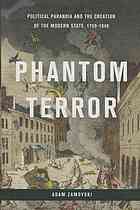
Phantom Terror
Political Paranoia and the Creation of the Modern State, 1789-1848
- اطلاعات
- نقد و بررسی
- دیدگاه کاربران
نقد و بررسی

December 15, 2014
In the first days of the French Revolution, minor nobles and the French lower classes hoped for greater liberties. Instead, as Zamoyski (Warsaw 1920) reveals in this meticulous, thorough account, the revolution’s devolution into a bloodbath and the subsequent rise and fall of Corsican upstart Napoleon created paranoia among monarchs, leading to the evolution of narrowly focused police and agents provocateurs (who became models for state agents in Nazi Germany and the Soviet Union). Zamoyski demonstrates how this atmosphere enveloped not only France, but much of Europe, leading to increased restrictions and harsh punishments, notably for students and foreigners. In the midst of the overarching theme of progressive (also called liberal or radical) movements and their opponents, key figures such as Wellington, Napoleon, Czar Alexander, and the Bourbon heirs pale beside the grand schemer and architect of the multicountry alliance: Austrian foreign minister Klemens von Metternich. It’s a dense but stimulating work; Zamoyski takes an infamous 18th-century class struggle and painstakingly shows how the resulting suppression manifested itself through sophisticated spy networks and Germany’s heightened nationalism, as well as a chasm between the economic and social classes that persists today. Clare Alexander, Aitken Alexander Assoc.

November 15, 2014
Zamoyski (Poland: A History, 2012, etc.) shows how the French Revolution instigated fear in the hearts of European governments, most of it unfounded and falsely propagated by undefined fears and self-perpetuating rumors.The author examines how broadly European countries enacted reactionary and draconian laws meant to control the masses. Austrian Prime Minister Klemens von Metternich was a prime example, especially since it was he who encouraged the spread of false stories like that of the Comite Directeur-ostensibly a revolutionary group that was the driving force behind all the insurrections and demonstrations that occurred across Europe, even though it never existed and the demonstrations were caused by high bread prices and poor working conditions. "Nowhere was there any sign of anyone, let alone any body, directing anything," writes the author. "There was no transnational cooperation." The chaos immediately following the French Revolution was subdued by the ascent of Napoleon, who instituted central organs of control, while other countries relied on local governance. With the defeat of Napoleon, the "Holy Alliance" of Russia's Alexander I, Austria's Francis I and Prussia's Frederick William III attempted to return to a social order based on throne and altar and eliminate the influence of the Enlightenment and the belief in popular sovereignty. All were irrationally aggressive, fearing a new revolution backed by the secret organizations of the Comite, Freemasons, Jacobins and Illuminati. That aggression took the form of spies and secret police in every country, most widely under Metternich. Though the French Revolution may have spread the idea of the "rights of man," it also increased the fears and the power of those who repressed it. Zamoyski provides perhaps too many examples of severe sentencing of innocents, but his point is important, and his book comprehensively examines the role of the powerful over the weak and the effects of governmental overreactions.
COPYRIGHT(2014) Kirkus Reviews, ALL RIGHTS RESERVED.

January 1, 2015
Zamoyski (Poland: A History) focuses on the period after the French Revolution of 1789, when fear of liberal ideas became associated with revolutionary violence and European governments promulgated a spate of reactionary polices. Ironically, that French-style revolutionary movements were forming in their midst, other European governments began copying the French model of a secret police establishment, including the use of spies and agents provocateurs, to clamp down on dissent. Zamoyski's examination of the process of repression makes the book more than a retelling of the history of Europe from 1789 to 1848. The author of numerous studies on the Romantic era, Zamoyski provides insight into the political elites who sought to maintain the status quo. VERDICT In pursuit of the story of paranoia and repression, Zamoyski has mined an impressive selection of primary sources from Britain to Austria. His sympathy is clearly with the liberal reformers, and he ridicules the notion that repressive legislation of the era was even necessary. While the author periodically falls into his own polemics, often describing conservative thinkers as "hysterical," the book is well written and should appeal to a wide audience.--Frederic Krome, Univ. of Cincinnati Clermont Coll.
Copyright 2015 Library Journal, LLC Used with permission.




دیدگاه کاربران